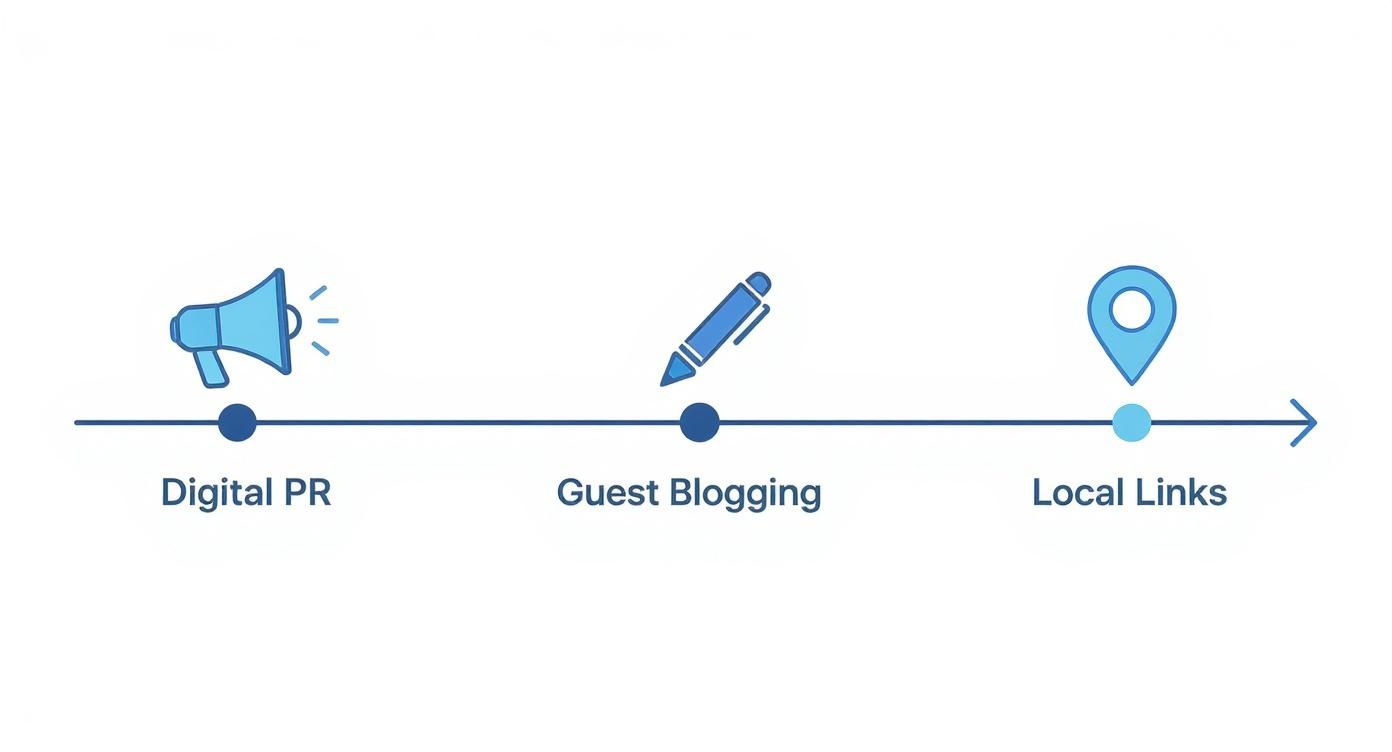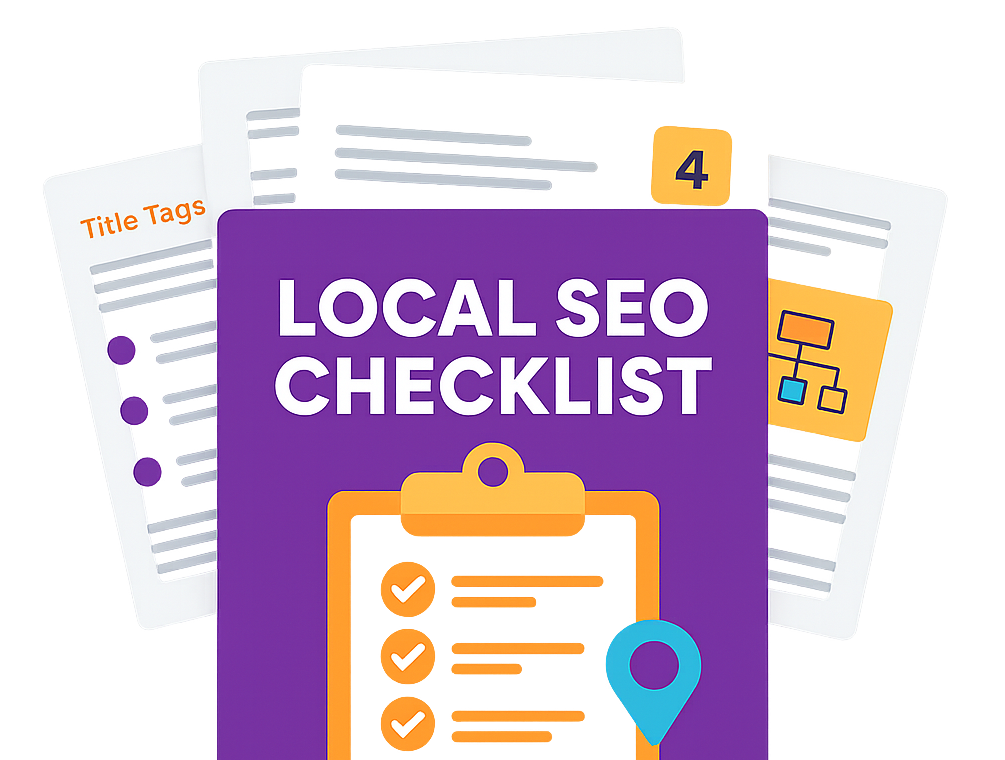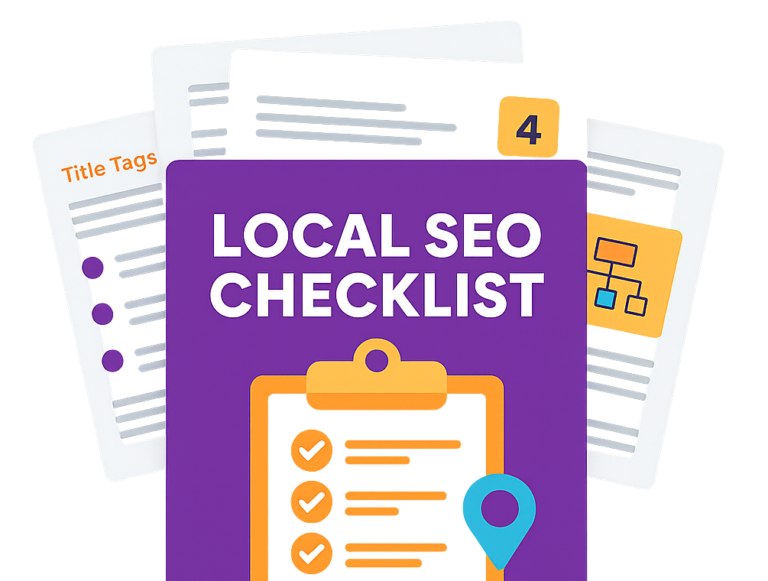Any good SEO strategy starts by defining what you're actually trying to achieve. It’s about building a repeatable process that ties every single SEO task back to real business results, making sure your efforts lead to growth, not just vanity metrics.
Building Your SEO Foundation

Before you even think about keywords or backlinks, you need to get your foundation right. This is where you connect your SEO work to what your business actually needs, ensuring every move you make contributes to measurable growth.
Think of this part as setting your strategic compass. It will guide every decision you make down the line, so your time and money are spent effectively. To get started, a solid grasp of the basics is essential; you can find an in-depth guide to SEO practices that gives a great overview of the fundamentals.
Defining What Success Looks Like
The biggest mistake I see businesses make is chasing rankings and traffic for the sake of it, instead of focusing on what really matters: revenue. The true test is whether your SEO is bringing in qualified leads, cutting your customer acquisition costs, or boosting your brand’s visibility in the right places.
Start with a simple question: What would make SEO a clear win for our business this year? The answers should always be tied to business outcomes, not just abstract SEO metrics.
- For a local plumbing service in Cambridgeshire: Success might be generating 20 new quote requests per month from local search results.
- For a UK-based e-commerce shop selling handmade crafts: The goal could be a 25% increase in organic revenue from product and category pages.
- For a B2B software company: A clear win could be 50 qualified demo sign-ups from people searching for solutions you offer.
These are tangible results that impact your bottom line. Once you have a clear business goal, you can work backwards to figure out your Key Performance Indicators (KPIs).
Your KPIs are the bridge between your SEO activities and your business goals. Instead of just tracking 'keyword rankings', focus on metrics like 'organic conversion rate', 'cost per lead from organic search', and 'revenue from organic traffic'.
Understanding the UK SEO Market
An effective strategy also means knowing the field you're playing on. In the UK, SEO is no longer a niche marketing tactic; it's a critical channel. Recent findings show that 60% of UK businesses now have an SEO strategy in place.
Even more telling is that among those businesses, 90% believe their strategy is effective. This tells us that when SEO is done right, it delivers. It also shows that while the competition is embracing SEO, there's a huge opportunity for businesses with a focused, well-executed plan to pull ahead.
If you’re just starting out, our comprehensive https://www.bare-digital.com/seo-checklist-for-new-website/ is the perfect place to begin. Getting this foundational work done ensures your site is technically sound and ready for a more advanced strategy. Without it, even the best keyword research and content will fall flat.
Auditing Your Current SEO Health
Before you can map out where you’re going, you need to know exactly where you are. An SEO audit is that starting point—a completely honest look at your website’s current performance, technical foundations, and where you stand against the competition.
This isn’t about finding fault. It’s about uncovering opportunities, spotting quick wins, and laying the groundwork for real, long-term growth. Think of it as an MOT for your website; we’re lifting the bonnet to see what’s working and what’s holding you back before we hit the accelerator.
Pinpointing Technical Gremlins
Technical SEO is the bedrock of any successful strategy. If search engines can’t crawl, understand, and index your website efficiently, even the most amazing content will go unseen. The good news? These technical issues are often the easiest to fix and can deliver a noticeable impact pretty quickly.
You don't need to be a developer to get a handle on this. There are plenty of accessible tools out there to help you spot common problems. A great place to start is your website’s speed—it’s a confirmed ranking factor and absolutely vital for keeping users happy.
For example, a performance report from Google's PageSpeed Insights will show you exactly how you’re doing on both mobile and desktop.
The report breaks down key metrics like Core Web Vitals and gives you actionable suggestions to speed things up.
Other critical areas to check include:
- Mobile-friendliness: How does your site actually look and work on a smartphone?
- Broken links: Are any links sending users to a frustrating "404 Not Found" page?
- Crawlability: Can search engine bots easily find and navigate your content?
- Duplicate content: Are there multiple versions of the same page confusing search engines?
For a more structured walkthrough, our guide offers a detailed technical SEO audit checklist that covers all the essential elements to review.
Assessing Content and Competitor Performance
Once your site's technical health is in check, it’s time to see how your content is performing. What’s actually driving traffic, and what’s falling flat? Tools like Google Search Console are brilliant for this—they show you which pages get impressions and clicks, and for what search terms.
This analysis is invaluable. It tells you what resonates with your audience. Are your blog posts bringing in new visitors? Are your service pages turning those visitors into customers? This is the data that will shape your future content plan.
At the same time, you need to size up the competition. Pick out two or three key rivals who consistently show up for your target keywords and take a close look at what they’re doing. You’ll want to understand:
- What keywords are they ranking for?
- What kind of content are they producing?
- How strong is their backlink profile?
This isn’t about copying them. It’s about benchmarking your own performance and, more importantly, finding the gaps in their strategy that you can exploit.
An SEO audit reveals your baseline. It transforms guesswork into a data-driven plan, showing you exactly where to focus your resources for the biggest impact. Prioritise fixing technical issues first, then use content and competitor insights to build your forward-looking strategy.
In the UK, a successful SEO strategy absolutely has to prioritise mobile optimisation and technical health. Since 2025, 100% of websites indexed by Google are based on mobile-first crawling, making a slick mobile experience non-negotiable. With 66% of all Google search traffic in the UK coming from mobile devices, you can’t afford to ignore it. It’s no surprise that technical SEO is a key tactic for 48% of UK businesses. You can discover more insights about the latest Google SEO statistics at SQ Magazine.
Mastering Keyword Research and Content Planning

If content is the engine of your SEO, then keywords are the fuel that makes it run. But great keyword research isn't about chasing the terms with the biggest search volumes. It’s about digging into the why behind every search, connecting what your ideal customers are looking for with the solutions you offer.
The first real step in any solid SEO strategy is learning how to choose keywords for SEO that genuinely resonate with your audience. For a UK business, this means getting specific and thinking about the exact language your local customers use. The aim is to build a content plan that doesn't just pull in traffic, but guides those visitors toward becoming actual customers.
Look Beyond High-Volume Keywords
It’s easy to get fixated on broad, high-volume keywords like "plumber London". Sure, it gets thousands of searches, but it’s also fiercely competitive and often attracts people who are just window shopping. A far smarter approach is to zero in on long-tail keywords.
These are the longer, more specific phrases that give away what a user really wants. For instance, someone searching for "emergency plumber for leaking pipe in Islington" isn't just browsing—they have a real, urgent problem and are ready to hire someone. Now.
This shift from volume to intent is non-negotiable. Over 58% of searches now end without a single click, as people find answers right there in the search results. This means the traffic that does click through is often more qualified and much closer to making a decision. Your job is to capture that high-intent traffic.
Identifying True User Intent
Understanding user intent is all about figuring out what someone wants to achieve with their search. Are they just gathering information? Comparing their options? Or are they ready to pull out their credit card? Answering this lets you create content that meets them exactly where they are.
There are four main types of user intent we focus on:
- Informational: The user wants an answer to a question (e.g., "how to fix a dripping tap").
- Navigational: The user is trying to get to a specific website (e.g., "Bare Digital SEO").
- Commercial Investigation: The user is weighing up products or services before buying (e.g., "best boiler brands UK").
- Transactional: The user is ready to buy or take immediate action (e.g., "book a gas safety certificate check").
Matching your keywords to these intent types is the bedrock of a content plan that actually delivers results. You can get a deeper dive into this process in our guide on what is keyword research.
To make this practical, we use a simple framework to map keywords to the customer journey. It ensures we're creating the right type of content to meet a user's needs at every stage, from initial awareness to the final purchase decision.
Keyword Intent Mapping Framework
| Customer Journey Stage | Keyword Intent | Example Keyword (UK Focus) | Recommended Content Format |
|---|---|---|---|
| Awareness | Informational | "why is my boiler making a noise" | Blog Post, How-To Guide, FAQ Page |
| Consideration | Commercial Investigation | "Vaillant vs Worcester boiler review" | Comparison Guide, In-Depth Review, Case Study |
| Decision | Transactional | "boiler installation quote Cambridge" | Service Page, Landing Page, Online Booking Form |
| Loyalty | Navigational / Informational | "Bare Digital boiler service plan" | Customer Portal, Loyalty Programme Page, Maintenance Tips |
This framework helps turn a messy list of keywords into a strategic content roadmap, ensuring you have valuable touchpoints for customers no matter where they are in their journey.
Building a Practical Content Calendar
With your keywords sorted by intent, it's time to plan when and how you’ll create the content. A content calendar is your best friend here, keeping your SEO strategy organised and ensuring a steady stream of high-quality, optimised content.
And no, it doesn't need to be some complex piece of software. A simple spreadsheet often works best.
A content calendar isn't just a schedule; it's a strategic document that ensures every piece of content has a purpose. It prevents you from creating content randomly and forces you to think about how each article or page supports your business goals.
Your calendar should track the essentials for each piece of content. This brings clarity to the process and keeps everyone on your team aligned.
Here’s a simple structure you can borrow and adapt:
| Column | Description | Example |
|---|---|---|
| Publish Date | The target date for the content to go live. | 15th October 2024 |
| Content Title | A working title for the blog post or page. | How to Prepare Your Boiler for Winter |
| Primary Keyword | The main long-tail keyword you're targeting. | "winter boiler check London" |
| User Intent | The stage of the journey you're targeting. | Informational / Commercial |
| Content Format | The type of content (e.g., blog post, guide). | Step-by-Step Guide |
| Status | The current stage of production. | Writing in Progress |
This structured approach is what turns a list of good ideas into an actionable plan. It guarantees you’re creating a balanced mix of content for every stage of the customer journey, transforming your website into a genuinely useful resource that both people and search engines will love.
Building Authority with Off-Page SEO
Creating exceptional content is a huge step, but honestly, it’s only half the battle. If you want your website to truly compete for those valuable keywords, it needs authority. This is where off-page SEO comes in—the art and science of building a strong, natural backlink profile that tells search engines you’re a trustworthy source.
Think of backlinks as votes of confidence. When a reputable site links to your content, it’s basically telling Google, "Hey, this is a valuable resource worth paying attention to." A diverse and high-quality collection of these "votes" can dramatically improve your visibility for the search terms that actually matter to your business.
Moving Beyond Outdated Tactics
In the old days, link building had a bad rap for spammy, low-quality methods. Those tactics don't work anymore and can actively get your site penalised. Modern, ethical link building is all about earning links, not just grabbing them from anywhere you can. It’s more like a public relations exercise for your website, focused on building genuine relationships and creating assets that people naturally want to share and reference.
This means quality always trumps quantity. A single, authoritative link from a well-respected UK industry blog is worth far more than a hundred links from irrelevant, low-quality directories. The goal is to build a backlink profile that looks natural and proves your expertise within your niche.
Core Strategies for Earning High-Quality Links
A solid off-page SEO plan involves a mix of tactics. Forget quick fixes; these methods require consistent effort but deliver sustainable, long-term results that build real brand authority.
Here are a few powerful, ethical approaches to get you started:
- Digital PR: This is about creating newsworthy content—think original research, data studies, or compelling stories—and then pitching it to journalists and bloggers in your industry. A successful campaign can land you coverage and links from major publications.
- Guest Blogging on Relevant UK Sites: Writing for other reputable websites in your field positions you as an expert and earns you a valuable backlink. The key is to target sites your ideal customers actually read, providing genuine value in your post.
- Creating Shareable Resources: Develop genuinely useful content that others in your industry will want to link to. This could be a comprehensive guide, a free tool, an original infographic, or a detailed case study that solves a common problem.
- Leveraging Local Community Partnerships: For local businesses, say in Cambridgeshire, building relationships with other local organisations, sponsoring events, or getting featured in local directories can generate powerful, geographically relevant links.
If you’re ready to dive deeper into the practical steps, our complete guide explains how to build backlinks with actionable techniques perfect for any UK business.
Think of off-page SEO as building your website's professional network. Each quality link you earn is like a strong recommendation from a respected peer, collectively boosting your reputation and credibility in the eyes of search engines.
Analysing Your Competitors' Backlinks
One of the smartest ways to kickstart your link-building efforts is to see what's already working for your competitors. By analysing their backlink profiles, you can uncover a goldmine of opportunities.
Use SEO tools to find out which websites are linking to your top three competitors. Pay close attention to the context of these links. Are they being featured in "best of" lists? Quoted as experts? Reviewed on industry blogs? This intelligence gives you more than just a list of websites to target; it reveals the exact types of content that attract links in your specific market. This analysis is a crucial piece of the puzzle for how to create an SEO strategy that’s built on data, not just guesswork.
Measuring Success and Budgeting for Growth
An SEO strategy isn't a "set it and forget it" task. Think of it as a living plan that needs constant attention, measurement, and fine-tuning. This is where you connect your day-to-day SEO work back to your business goals, proving the value of your investment and helping you make smarter decisions about what to do next.
It all starts with setting up a simple but effective reporting system. We’ll focus on the metrics that actually matter for tracking your KPIs, using free tools every business owner should get comfortable with.
Setting Up a Powerful Reporting System
To measure success, you need the right tools in your corner. For most UK businesses, the perfect starting point is a combination of Google Analytics 4 (GA4) and Google Search Console. They're free, overflowing with data, and when used together, they paint a crystal-clear picture of what's working and what isn't.
- Google Search Console is your window into how your site performs in Google search results. It tracks impressions (how often your site appears), clicks, click-through rate (CTR), and your average ranking positions for specific keywords. It’s your direct line to Google.
- Google Analytics 4 picks up where Search Console leaves off, telling you what happens after someone clicks through to your site. It tracks user behaviour—which pages they visit, how long they stay, and, most importantly, whether they complete key actions like filling out a contact form or buying a product.
Your monthly report doesn't need to be an epic novel. The real goal is to spot trends over time and directly connect your SEO activities to those initial KPIs you defined.
Phasing Your Strategy and Allocating Resources
One of the biggest mistakes businesses make is trying to do everything at once. A successful SEO strategy is rolled out in phases, prioritising the actions that will deliver the biggest impact first. This phased approach also makes budgeting far more manageable.
This timeline gives you a good idea of how you might structure your off-page SEO efforts, starting with foundational work like Digital PR before moving into more tactical areas like guest blogging and local link building.

This visual flow really drives home the point that building authority is a cumulative process. Each activity builds on the last, creating a strong, trustworthy backlink profile over time.
To map this out, a phased implementation plan is crucial. It breaks down the entire strategy into manageable chunks, making it easier to execute and track.
Sample Phased SEO Implementation Timeline
| Phase | Timeline | Key Activities | Primary KPIs |
|---|---|---|---|
| Phase 1: Foundation | Months 1-3 | Technical audit fixes, on-page optimisation for core pages, keyword mapping, setting up analytics and tracking. | Improved Core Web Vitals, reduced crawl errors, increase in keyword rankings for core terms. |
| Phase 2: Content & Authority | Months 4-6 | Execute content calendar (blog posts, guides), begin foundational link building (local citations, directory listings). | Growth in organic traffic, new referring domains, increase in non-branded keyword visibility. |
| Phase 3: Growth & Refinement | Months 7-12 | Scale content production, ramp up tactical link building (guest posts, PR), analyse data to double down on winning content. | Increased organic conversions (leads/sales), improved domain authority, higher rankings for competitive keywords. |
This timeline ensures you're not spreading your resources too thin. You build the strong foundation first, then layer on more advanced tactics as you gather data and gain momentum.
Your budget should mirror this phased approach. Allocate more resources to technical fixes and content creation upfront, then shift your investment towards outreach and content promotion as your foundation solidifies.
Setting a Realistic SEO Budget
Knowing how much to invest in SEO is a critical piece of the puzzle. It’s not just another business cost; it's a long-term investment in a marketing asset that will pay dividends for years to come.
The financial commitment to SEO in the UK really highlights its growing importance. In 2023, the UK SEO market was valued at a staggering £19.2 billion, with experts forecasting it could climb as high as £25 billion by 2028. This growth is no accident—it's fuelled by proven results, with 42% of UK adults turning to search engines first when looking for a product or service. You can dive deeper into these numbers with Artios.io's roundup of UK SEO stats.
So, what does this actually mean for your budget? It varies.
- DIY Approach: If you're tackling SEO in-house, your main costs will be your time and tool subscriptions, which can run anywhere from £100 to £300 per month.
- Freelancer/Small Agency: For a small local business here in Cambridgeshire, working with a specialist might cost between £500 to £2,000 per month.
- Full-Service Agency: A more comprehensive national campaign can easily be £2,000 to £5,000+ per month, covering all the bases—technical, content, and off-page SEO.
The right budget ultimately depends on your goals, how competitive your market is, and the speed at which you want to see results. The most important thing is consistency. A smaller, steady investment over a year will always beat a large, sporadic spend for just a few months.
Your Top SEO Strategy Questions Answered
Diving into search engine optimisation can feel like learning a new language, and it’s completely normal to have a few questions before you get started. We hear the same queries time and again from UK business owners, so I've put together this final section to tackle them head-on.
Think of this as a quick-fire FAQ to clear up any lingering doubts. Building a solid SEO strategy is a marathon, not a sprint, but getting these fundamentals right will help you set realistic expectations from day one.
How Long Until I See SEO Results in the UK?
This is the big one, and the honest answer is always "it depends." Patience is a non-negotiable in the world of SEO. While you might spot a small uplift from minor technical fixes or on-page tweaks within a few weeks, seeing a real shift in rankings for competitive keywords usually takes anywhere from four to twelve months.
A few things will affect that timeline:
- Your Market's Competitiveness: A local plumber in a small town will almost certainly see results faster than a national e-commerce brand.
- Your Website's History: An established website with some existing authority has a head start. A brand-new domain is starting from scratch and needs to build trust with Google first.
- How Consistent You Are: SEO isn't a "set it and forget it" task. You need to consistently create content, build links, and keep your technicals in check to build and maintain momentum.
For a completely new website, it's best to see the first six months as purely foundational. You're laying the groundwork—the technical base and content library—that Google needs before it will even start to take you seriously.
How Much Should a Small UK Business Budget for SEO?
SEO costs can vary wildly, so there’s no single "correct" price. It's far more helpful to think of it as an investment in a long-term marketing asset, not just another monthly expense. A good strategy should pay for itself by bringing in qualified leads and sales.
To give you a rough idea of the UK market:
- The DIY Route: If you're handling it all yourself, your main costs are your time and tool subscriptions. Budget for around £100 to £300 per month.
- Freelancer or Small Agency: A typical local business might invest anywhere from £500 to £2,000 per month.
- National Campaigns: For businesses targeting a wider, more competitive market, budgets often start at £2,000 and can go up to £5,000+ per month.
When you're starting out, try to find a budget that allows for consistent, quality work over at least six to twelve months. A smaller, steadier investment over the long haul will always beat a big, short-term splurge.
Can I Do SEO Myself or Should I Hire an Expert?
It's absolutely possible to manage your own SEO, especially if you're a small, local business with a relatively straightforward website. Many of the foundational tasks are well within reach for a business owner who's willing to learn the ropes.
You can probably handle:
- Basic On-Page SEO: Writing keyword-focused title tags, meta descriptions, and optimising your content.
- Local SEO: Managing your Google Business Profile is a must for any local business, and it's something you can definitely do yourself.
- Simple Keyword Research: Finding relevant long-tail keywords for your core services or products.
That said, SEO is a deep and constantly changing field. When you're up against tough competition, dealing with complex technical issues, or trying to run a sophisticated link-building campaign, hiring a professional is often far more effective. A hybrid approach works well too—you handle the day-to-day stuff while an agency or freelancer takes care of the heavier lifting.
What’s the Difference Between On-Page, Off-Page, and Technical SEO?
Getting your head around these three pillars is crucial for understanding how to create an SEO strategy. They all rely on each other; neglect one, and the others will suffer.
Think of your website as a house. Technical SEO is the foundation and wiring. On-Page SEO is the interior design and furniture. And Off-Page SEO is your reputation in the neighbourhood.
Let's break them down:
- Technical SEO: This is all about your website's plumbing. It ensures your site is fast, secure, mobile-friendly, and easy for search engine crawlers to read. Without a solid technical base, everything else is built on shaky ground.
- On-Page SEO: This covers everything on your actual web pages—the quality of your content, the keywords you use, your title tags, headings, images, and internal links. This is how you show users and search engines what your pages are all about.
- Off-Page SEO: This involves all the activities you do away from your website to build its authority. The biggest part of this is earning backlinks from other reputable sites, but it also includes things like brand mentions, social media signals, and online reviews. These signals tell Google that other people vouch for you.
A truly powerful strategy needs a balanced focus across all three areas, making sure they work in harmony to lift your overall visibility in search results.
Ready to stop guessing and start growing? At Bare Digital, we create data-driven SEO strategies that deliver real results for businesses across Cambridgeshire and beyond. Get your free, no-obligation SEO Health Check and a tailored proposal within 24 hours. Let's build a plan that works for you. Start your free SEO audit today.








